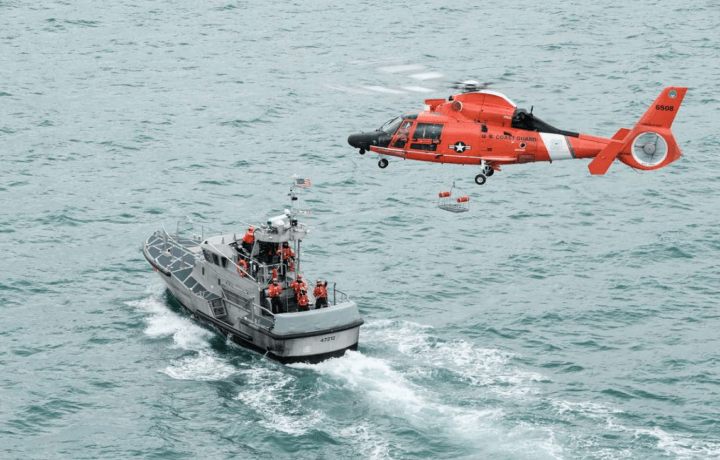Last week, the United States Coast Guard announced that it had seized more than 40,000 pounds of cocaine in the Eastern Pacific Ocean since it launched Operation Pacific Viper in early August. The U.S. Coast Guard, a branch of the U.S. military under the Department of Homeland Security, has been conducting drug interdiction patrols on both coasts.
It was further announced that during the 59-day patrol of the Caribbean Sea and Windward Passage, the Coast Guard Cutter USCG Vigilant (WMEC-617) interdicted 3,100 pounds of illicit drugs while in support of the Joint Interagency Task Force – South (JIATF-S) mission of detecting and monitoring illegal drug shipments. The drug seizures further contributed to the Coast Guard’s largest drug offload to date, where it offloaded 76,140 pounds of narcotics, including approximately 61,740 pounds of cocaine and nearly 14,400 pounds of marijuana.
“The U.S. Coast Guard brings unique authorities and unmatched capabilities as the world’s leader in maritime counter-drug operations,” said Rear Adm. Douglas Schofield, acting deputy commandant for operations.
“Our maritime fighting force is accelerating counter-drug operations in the Eastern Pacific Ocean,” Scholfield added. “We are leveraging our full range of capabilities to disrupt transnational criminal organizations and cartels and prevent the scourge of illicit drugs from reaching our communities. The men and women of the Coast Guard will not relent in our efforts to control, secure, and defend U.S. borders and maritime approaches—where defense of America begins.”
Coast Guard Patrols Have Increased
The U.S. Coast Guard explained that “detecting and interdicting illicit drug traffickers on the high seas involves significant interagency and international coordination because 80% of drugs are interdicted on the high seas.” However, the success rate needs to be considered and put into perspective.
Past efforts by the U.S. Coast Guard to stop the flow of illegal drugs have been mainly consistent, according to data from the U.S. Naval Institute. However, the total amount of maritime-trafficked cocaine interdicted by the Coast Guard held between 7.1 and 15.3% in recent years.
“While these numbers may seem low, they aren’t far from the Coast Guard’s goal, which has been a removal rate of 10 percent for the past few years,” the U.S. Naval Institute explained. The issue is the vastness of the waters the U.S. Coast Guard has had to maintain.
Critics of the deployments have argued that drug cartels make such massive profits, and the losses incurred from Coast Guard interdictions are considered a manageable “business tax.” With drug production remaining high, the financial hit from the seizures is unlikely to deter the trafficking operations.
Working With the U.S. Navy
Coast Guard interdiction teams have also been deployed aboard the U.S. Navy’s warships that have been deployed to both coasts. Last month, the Pentagon also sent two Arleigh Burke-class Aegis guided-missile destroyers to the waters off Venezuela. The warships, along with thousands of United States Marines, are part of the White House efforts to combat South America’s drug cartels. The Trump administration had stated that President Nicolás Maduro’s regime is not the legitimate government of Venezuela, and accused it of being a “narco-terror cartel.” Maduro was indicted in absentia in New York in 2020 on narco-terrorism and cocaine importation conspiracy charges.
The Wasp-class amphibious assault ship USS Iwo Jima (LHD-7) and her amphibious ready group were also deployed to the region before returning home to Norfolk to avoid Hurricane Erin.
The U.S. Navy and Coast Guard continue to maintain a presence off Venezuela, and last week the White House confirmed that a “drug boat” that had departed from Venezuela was sunk with 11 on board. The U.S has claimed the Tren de Aragua cartel operated the boat and that it was carrying drugs bound for the United States.
There have been allegations that it may have violated international human rights and maritime law. The U.S. is not a signatory to the United Nations Convention on the Law of the Sea; however, legal advisors to the U.S. military have previously stated that the U.S. military should “act in a manner consistent with its provisions.”
Secretary of State Marco Rubio has defended the sinking of the boat.
“The United States has long, for many, many years, established intelligence that allows us to interdict and stop drug boats. We did that. And it doesn’t work,” Rubio told reporters during a press conference in Mexico City. “What will stop them is when you blow them up, when you get rid of them.”




